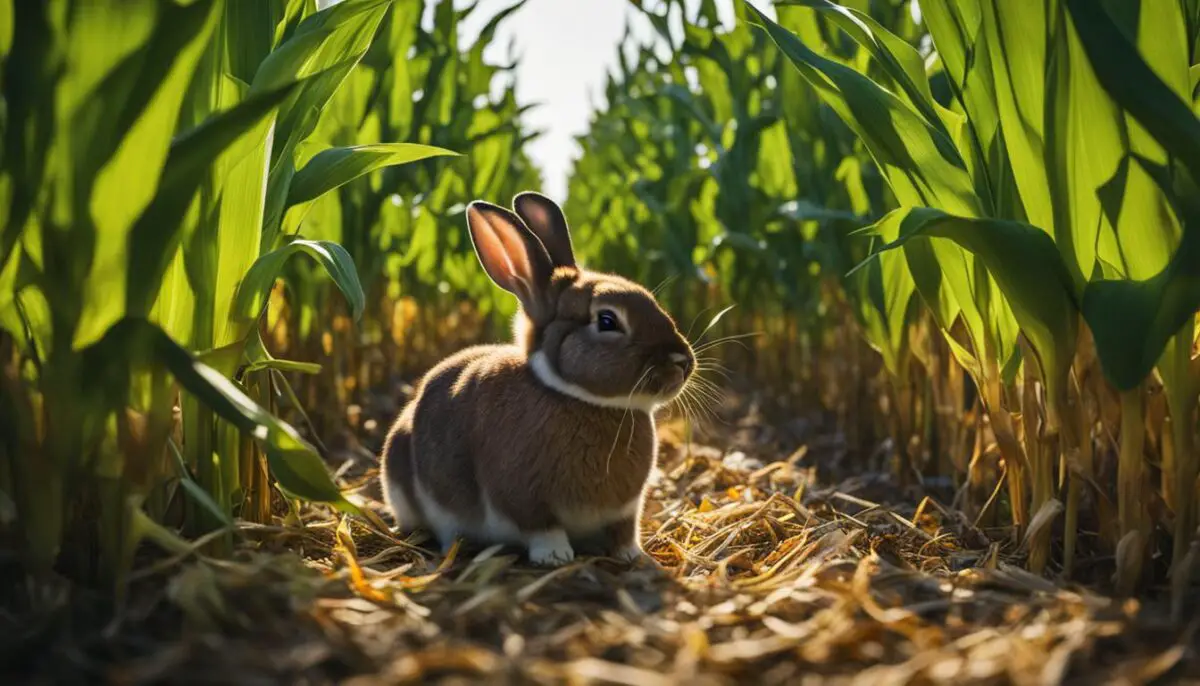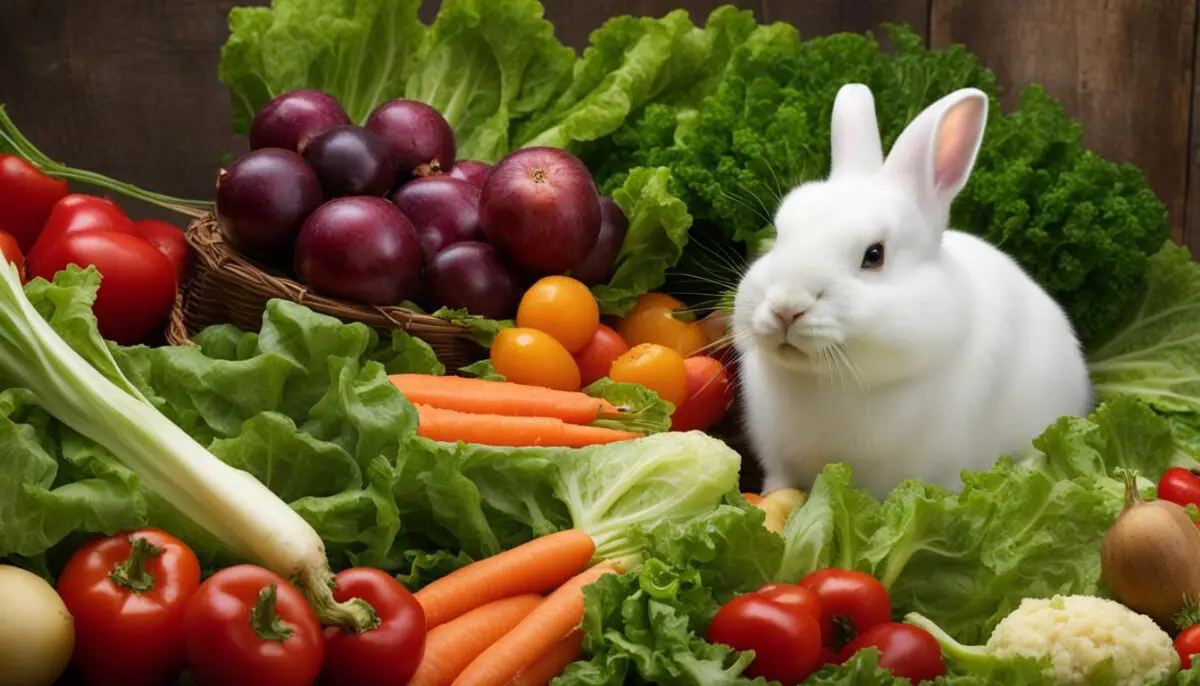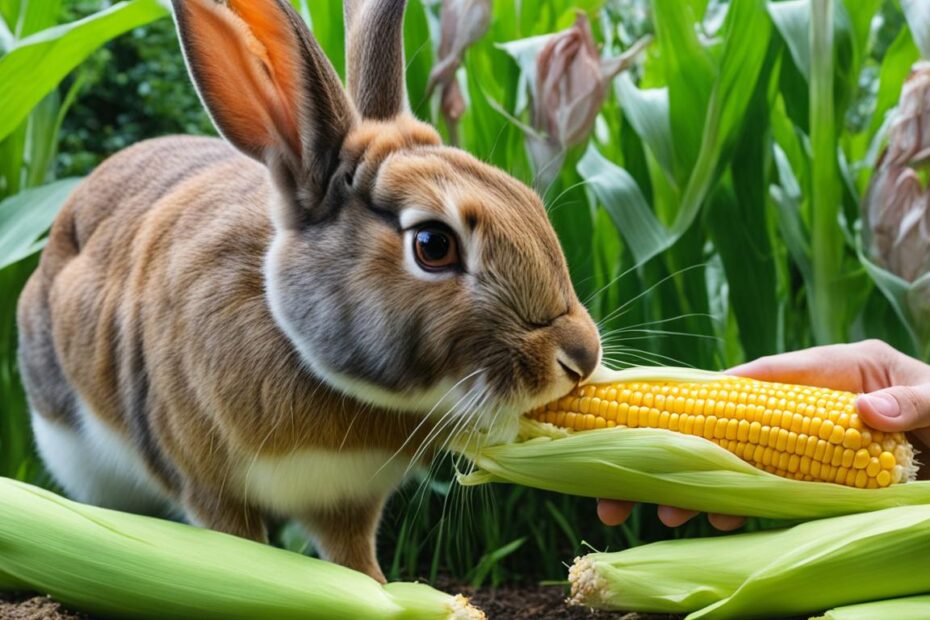Rabbits are adorable and lovable pets known for their fluffy coats and twitching noses. As responsible rabbit owners, it’s important to ensure that they have a balanced diet that meets their nutritional needs. One common question that often arises is, “Can rabbits have corn?” Let’s explore the topic of corn in a rabbit’s diet and learn some safe feeding tips.
When it comes to a rabbit’s diet, hay should be the staple component, making up 80-90% of their intake. Hay provides essential fiber and helps maintain healthy digestion. Good options for hay include timothy, orchard grass, brome, and oat hay. Pellets should be given in small quantities, differing based on the rabbit’s size and age. Fresh vegetables and occasional fruit treats can also be included, but some foods like potatoes, corn, beans, seeds, and nuts should be avoided.
Key Takeaways:
- Rabbits require a balanced diet of hay, fresh vegetables, fruit, and a small amount of pellets.
- Hay should make up the majority of a rabbit’s diet, with good options including timothy, orchard grass, brome, and oat hay.
- Avoid feeding rabbits foods such as potatoes, corn, beans, seeds, and nuts.
- Fresh water should always be provided for rabbits.
- Introduce new foods gradually and consult with a veterinarian for personalized dietary advice.
What Makes Up a Rabbit’s Diet?
A rabbit’s diet is comprised of various components that contribute to their overall health and well-being. By providing a balanced and diverse diet, you can ensure that your furry friend receives the necessary nutrients for optimal development and vitality. Let’s take a closer look at the key elements that make up a rabbit’s diet.
1. Hay for Rabbits
Hay is an essential part of a rabbit’s diet and should make up the majority of their daily food intake. It is rich in fiber, which helps maintain proper digestion and prevents gastrointestinal issues. Good options for hay include timothy, orchard grass, brome, and oat hay. However, it’s important to avoid giving adult rabbits alfalfa hay on a daily basis, as it is high in calcium and protein, which can lead to health problems. Instead, reserve alfalfa hay for younger rabbits or as an occasional treat.
2. Fresh Vegetables
Vegetables are an excellent source of vitamins and minerals for rabbits. Incorporating a variety of vegetables into their diet can provide essential nutrients to support their overall health. Some rabbit-approved vegetables include bell peppers, bok choy, and lettuce. However, it’s crucial to avoid feeding rabbits vegetables such as potatoes, corn, and beans, as these can cause digestive issues. Additionally, always introduce new vegetables gradually to prevent any potential digestive upsets.
3. Occasional Fruit Treats
Fruits can be given as a special treat to delight your rabbit. While they are tasty and provide natural sugars, it’s important to offer them sparingly, as excessive fruit consumption can cause obesity and other health problems. Suitable fruits for rabbits include apples, strawberries, and bananas. Remember to remove any seeds or pits and provide small, bite-sized portions to avoid choking hazards.
| Hay | Vegetables | Fruits |
|---|---|---|
| Timothy | Bell Peppers | Apples |
| Orchard Grass | Bok Choy | Strawberries |
| Brome | Lettuce | Bananas |
| Oat Hay |
4. Pelleted Food
Pelleted food is a convenient way to provide rabbits with essential nutrients. However, it should only constitute a small portion of their diet. The appropriate amount of pellets depends on the rabbit’s size and age. Consult with a veterinarian to determine the suitable quantity for your rabbit. When choosing pellets, opt for high-quality brands that contain a balanced blend of fiber, protein, and other essential nutrients.

In addition to hay, rabbits can also enjoy a variety of fresh vegetables and limited amounts of pellets. Leafy greens like lettuce, kale, and spinach can provide essential vitamins and minerals. Fruits, such as apples, strawberries, and bananas, can be given as occasional treats in small quantities.
Summary
While rabbits can technically have sweet corn, it is best to limit their intake due to its high sugar content and potential digestive issues. Instead, focus on providing a balanced diet with hay as the main component, supplemented with a variety of vegetables and occasional fruits. Sweet corn leaves can be offered as a delightful and nutritious addition in moderation. Consulting with a veterinarian can provide personalized dietary advice based on your rabbit’s specific needs.
Other Healthy Options for Rabbits
While sweet corn may not be the best choice for rabbits, there are plenty of other rabbit-friendly foods that can provide a nutritious and balanced diet. Incorporating a variety of healthy foods into your rabbit’s meals is essential for their overall well-being.
Leafy Greens for Rabbits
Fresh leafy greens are a great addition to a rabbit’s diet as they are rich in essential vitamins and minerals. Some healthy options include:
- Lettuce
- Kale
- Spinach
These leafy greens can be served in small quantities alongside hay and other vegetables to create a well-rounded meal for your furry friend.
Rabbit-Friendly Fruits
While fruits should be given sparingly due to their sugar content, they can be offered as occasional treats for rabbits. Here are some rabbit-friendly fruits:
- Apples
- Strawberries
- Bananas
Remember to remove any seeds, pits, or stems from the fruits before feeding them to your rabbit.
Rabbit Treats
Treats can be a great way to bond with your rabbit and provide enrichment. However, it is important to choose treats that are specifically made for rabbits and do not contain added sugar, preservatives, or artificial coloring.
Pro Tip: Look for natural rabbit treats that are made with healthy ingredients such as hay, herbs, and vegetables.
When offering treats, it’s essential to do so in moderation to prevent any dietary imbalances. Too many treats can lead to weight gain and other health issues in rabbits.
Consult with a Veterinarian
It is always a good idea to consult with a veterinarian for personalized dietary advice for your specific rabbit. They can provide recommendations based on your rabbit’s age, breed, health condition, and individual needs.
Remember to introduce new foods gradually to avoid any digestive upset and monitor your rabbit’s response to different foods to ensure they are well-tolerated.
By providing a balanced and varied diet, you can ensure that your rabbit receives the necessary nutrients for optimal health and happiness.

Importance of Hydration and Water
Proper hydration is essential for the health and well-being of rabbits. Just like humans, rabbits need access to fresh water at all times to stay hydrated and maintain their bodily functions. The lack of water can lead to dehydration, which can have severe consequences for rabbits.
When providing water for rabbits, it’s important to choose the right container. Water containers should be cleaned regularly to ensure cleanliness and prevent the growth of harmful bacteria. Bowls are recommended over water bottles as they are easier to clean and refill. A heavy ceramic bowl can also prevent tipping, ensuring that rabbits have a constant supply of water.
Rabbits should have an unlimited supply of fresh water available to them. This means that their water should be changed daily to maintain its freshness and cleanliness. By providing a consistent source of clean water, you can ensure that your rabbits are able to drink as much as they need throughout the day.
Adequate hydration is crucial for a rabbit’s overall health. Not only does water keep rabbits hydrated, but it also helps with digestion and regulates body temperature. By ensuring that your rabbits have access to fresh water at all times, you can promote their well-being and help prevent health issues related to dehydration.
Conclusion
In conclusion, providing a safe and balanced diet is essential for the optimal nutrition and overall well-being of rabbits. A balanced rabbit diet consists of hay, fresh vegetables, fruit, and a small amount of pellets. Hay should make up the majority of their diet, providing the necessary fiber for their digestive health. Fresh vegetables and fruit should be given in moderation, offering a variety of nutrients and flavors for their enjoyment.
However, it is important to avoid certain foods such as corn, beans, seeds, nuts, and potatoes as they can be harmful to rabbits. These foods can cause digestive issues and may lead to serious health concerns. Fresh water should always be available for rabbits to ensure proper hydration.
While sweet corn kernels are not recommended for rabbits due to their high sugar content, the leaves of sweet corn can be given as a treat. It is crucial to provide a diverse and balanced diet, consult with a veterinarian for personalized dietary advice, and introduce new foods gradually to prevent any adverse reactions or digestive disturbances.
By adhering to a safe feeding regimen and offering a well-balanced diet, rabbit owners can ensure that their furry companions receive the optimal nutrition they need to thrive. Remember, a healthy diet is key to a happy and energetic rabbit!
FAQ
Can rabbits have corn?
While rabbits can technically consume small amounts of sweet corn, it is not an ideal food choice for them due to its high sugar content. The kernels of sweet corn can disrupt their delicate digestive system and potentially cause gastrointestinal issues. However, the leaves of sweet corn are safe for rabbits to consume in moderation. They provide additional fiber and nutrients, making them a delightful addition to their diet. Sweet corn leaves should be given sparingly due to their high sugar content, and a diverse and balanced diet is crucial for a rabbit’s overall health.
What makes up a rabbit’s diet?
A rabbit’s diet consists of hay, fresh vegetables, fruit, and pellets. Hay should make up the majority of their diet, with good options including timothy, orchard grass, brome, and oat hay. Pellets should be given in small quantities, with the amount depending on the rabbit’s size and age. Vegetables such as bell peppers, bok choy, and lettuce can be included in a rabbit’s daily diet, while others like potatoes, corn, and beans should be avoided. Fruit should be given sparingly as a treat. It is important to offer a diverse and balanced diet to ensure the rabbit’s overall well-being.
What is the sweet corn dilemma?
While sweet corn may not be the best choice for rabbits, there are plenty of other rabbit-friendly foods to explore. Fresh leafy greens such as lettuce, kale, and spinach provide essential vitamins and minerals for rabbits. Fruits like apples, strawberries, and bananas can be given as occasional treats. It is important to introduce new foods gradually and consult with a veterinarian for personalized dietary advice. Treats for rabbits should be given sparingly and should not contain added sugar, preservatives, or artificial coloring. Providing a balanced and varied diet is essential for a rabbit’s health and well-being.
What are other healthy options for rabbits?
Rabbits need a balanced diet, so providing a variety of healthy foods is important. Fresh leafy greens such as lettuce, kale, and spinach provide essential vitamins and minerals. Fruits like apples, strawberries, and bananas can be given as occasional treats. It is important to introduce new foods gradually and consult with a veterinarian for personalized dietary advice. Treats for rabbits should be given sparingly and should not contain added sugar, preservatives, or artificial coloring. Providing a balanced and varied diet is essential for a rabbit’s health and well-being.
Why is hydration and water important for rabbits?
Rabbits need to stay hydrated, so it is crucial to provide them with access to fresh water at all times. Water containers should be cleaned regularly, and bowls are preferred over water bottles as they are easier to clean and use for rabbits. Providing a heavy ceramic bowl can prevent tipping. Rabbits should have an unlimited supply of fresh water, and the water should be changed daily to ensure cleanliness. Adequate hydration is crucial for a rabbit’s overall health and well-being.
What is the importance of a balanced diet for rabbits?
In order to ensure the overall health and well-being of rabbits, it is essential to provide them with a balanced diet. This includes a variety of hay, fresh vegetables, fruit, and a small amount of pellets. Hay should make up the majority of their diet, while vegetables and fruit should be given in moderation. Foods such as corn, beans, seeds, nuts, and potatoes should be avoided. Fresh water should always be available for rabbits. Consult with a veterinarian for personalized dietary advice and always introduce new foods gradually.


